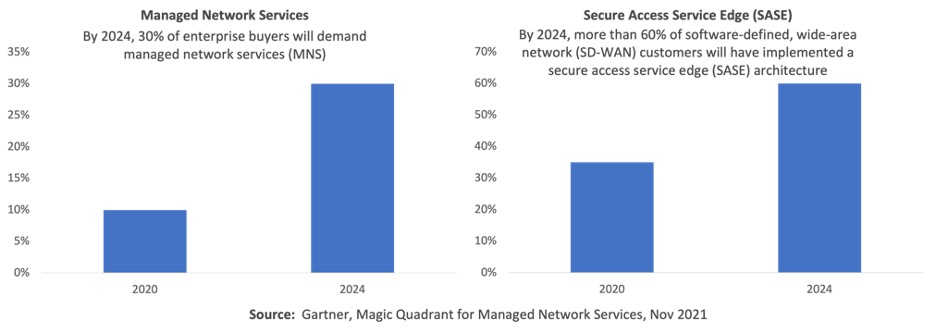With hybrid work and employees requiring more flexibility than ever, however, network performance should serve as an asset, not a commodity. Enterprises want agility with networks that can quickly provision applications while providing security and observability.
This economic uncertainty can provide an opportunity to rely more on managed services, eliminating costly capital investments and staff hours needed to operate specific capabilities. It will also
be a great reckoning of sorts as the bloated technology budgets seen during the pandemic will not need to return to normal but shrink even faster.
Invest in managed networks
The past decade has seen continued investment in digital transformation and cloud applications, while the traditional network and location-based design architecture has remained a constant. With
networks largely performing their function, the need for a managed network service was often pushed down the priority list.

Figure 2: Gartner predictions on managed network services
click to enlarge
With hybrid work and employees requiring more flexibility than ever, however, network performance should serve as an asset, not a commodity. Enterprises want agility with networks that can
quickly provision applications while providing security and observability. Managed networking allows an organization to outsource the monitoring and maintenance of its cloud and on-premises
infrastructure. With a managed service offering, customers can leverage wide area and local area network connections, firewalls, network access, virtual machines, and around-the-clock support.
Just as organizations have turned to managed services for the cloud and key applications, the same can be done with networks with a similar benefit. While some CIOs may want ownership over their
network, managed solutions can be a force multiplier that still uphold the necessary flexibility. When appropriately implemented, managed networks can offload operational complexities while
adding the benefit of faster change management with higher responsiveness. Additionally, managed networks offer

fast service delivery across all
sites and users to enable enterprise IT to focus on meeting digital transformation. Managed networks also enable the workforce to remain productive no matter where they work or what application
they use. Managed network services can significantly reduce costs and complexity, something needed as we head into the economic uncertainty of the winter. The approach works better with today’s
technology landscape, providing connectivity to hybrid and remote workers with charges typically based on a consumption model in contrast to legacy carrier and telcos.
Keeping networks secure
Managed network capabilities provide enhanced service at a reduced cost with increased security. The leading providers can converge network and security components to optimize the overall
experience and exceed what organizations can build on their own (or, at the very least, at a lower price point).




















